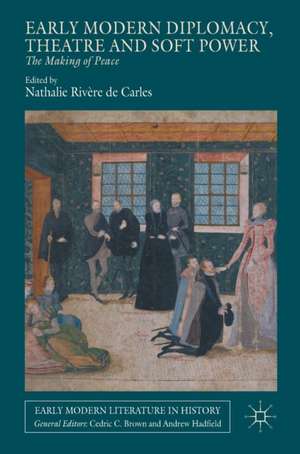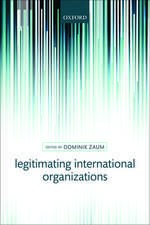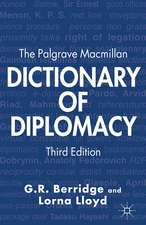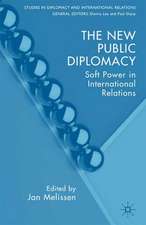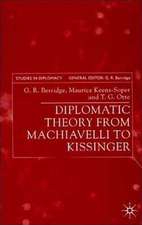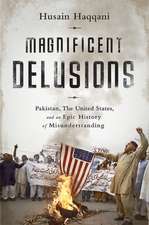Early Modern Diplomacy, Theatre and Soft Power: The Making of Peace: Early Modern Literature in History
Editat de Nathalie Rivère de Carlesen Limba Engleză Hardback – 29 dec 2016
Contributors investigate English, Italian and German plays of Renaissance theoretical texts on diplomacy, lifting the veil on the intimate relations between ambassadors and the artistic world and on theatre as an unexpected instrument of 'soft power'. The volume offers new approaches to understanding Early Modern diplomacy, which was a source of inspiration for Renaissance drama for Shakespeare and his European contemporaries, and contributed to fashion the aesthetic and the political ideas and practice of the Renaissance.
Din seria Early Modern Literature in History
-
 Preț: 395.47 lei
Preț: 395.47 lei - 20%
 Preț: 566.76 lei
Preț: 566.76 lei -
 Preț: 358.81 lei
Preț: 358.81 lei - 15%
 Preț: 704.17 lei
Preț: 704.17 lei -
 Preț: 408.92 lei
Preț: 408.92 lei -
 Preț: 387.75 lei
Preț: 387.75 lei -
 Preț: 392.60 lei
Preț: 392.60 lei -
 Preț: 389.70 lei
Preț: 389.70 lei -
 Preț: 390.25 lei
Preț: 390.25 lei -
 Preț: 387.20 lei
Preț: 387.20 lei -
 Preț: 390.63 lei
Preț: 390.63 lei -
 Preț: 390.63 lei
Preț: 390.63 lei - 15%
 Preț: 705.51 lei
Preț: 705.51 lei -
 Preț: 389.70 lei
Preț: 389.70 lei - 15%
 Preț: 639.41 lei
Preț: 639.41 lei - 18%
 Preț: 939.94 lei
Preț: 939.94 lei -
 Preț: 388.72 lei
Preț: 388.72 lei -
 Preț: 387.20 lei
Preț: 387.20 lei -
 Preț: 386.61 lei
Preț: 386.61 lei -
 Preț: 388.90 lei
Preț: 388.90 lei - 15%
 Preț: 702.54 lei
Preț: 702.54 lei -
 Preț: 389.11 lei
Preț: 389.11 lei - 15%
 Preț: 642.51 lei
Preț: 642.51 lei - 15%
 Preț: 640.06 lei
Preț: 640.06 lei - 15%
 Preț: 638.43 lei
Preț: 638.43 lei - 15%
 Preț: 698.94 lei
Preț: 698.94 lei -
 Preț: 386.39 lei
Preț: 386.39 lei - 15%
 Preț: 639.08 lei
Preț: 639.08 lei -
 Preț: 384.86 lei
Preț: 384.86 lei -
 Preț: 388.90 lei
Preț: 388.90 lei -
 Preț: 391.61 lei
Preț: 391.61 lei - 15%
 Preț: 643.00 lei
Preț: 643.00 lei -
 Preț: 391.61 lei
Preț: 391.61 lei -
 Preț: 387.75 lei
Preț: 387.75 lei -
 Preț: 389.70 lei
Preț: 389.70 lei -
 Preț: 390.63 lei
Preț: 390.63 lei - 15%
 Preț: 634.49 lei
Preț: 634.49 lei -
 Preț: 386.81 lei
Preț: 386.81 lei -
 Preț: 390.63 lei
Preț: 390.63 lei - 15%
 Preț: 641.85 lei
Preț: 641.85 lei -
 Preț: 388.72 lei
Preț: 388.72 lei - 15%
 Preț: 638.76 lei
Preț: 638.76 lei -
 Preț: 388.72 lei
Preț: 388.72 lei -
 Preț: 387.75 lei
Preț: 387.75 lei - 18%
 Preț: 728.11 lei
Preț: 728.11 lei - 15%
 Preț: 643.84 lei
Preț: 643.84 lei -
 Preț: 389.11 lei
Preț: 389.11 lei -
 Preț: 389.49 lei
Preț: 389.49 lei
Preț: 640.88 lei
Preț vechi: 753.97 lei
-15% Nou
Puncte Express: 961
Preț estimativ în valută:
122.66€ • 126.41$ • 103.56£
122.66€ • 126.41$ • 103.56£
Carte tipărită la comandă
Livrare economică 04-18 martie
Preluare comenzi: 021 569.72.76
Specificații
ISBN-13: 9781137436924
ISBN-10: 1137436921
Pagini: 248
Ilustrații: XV, 239 p. 2 illus.
Dimensiuni: 148 x 210 x 20 mm
Greutate: 0.43 kg
Ediția:1st ed. 2016
Editura: Palgrave Macmillan UK
Colecția Palgrave Macmillan
Seria Early Modern Literature in History
Locul publicării:London, United Kingdom
ISBN-10: 1137436921
Pagini: 248
Ilustrații: XV, 239 p. 2 illus.
Dimensiuni: 148 x 210 x 20 mm
Greutate: 0.43 kg
Ediția:1st ed. 2016
Editura: Palgrave Macmillan UK
Colecția Palgrave Macmillan
Seria Early Modern Literature in History
Locul publicării:London, United Kingdom
Cuprins
1. The Poetics of Diplomatic Appeasement in the Early Modern Era; Nathalie Rivère de Carles.- PART I. FROM TRUCE TO NEGOTIATED PEACE: THE TEMPORAL DIPLOMACIES OF A LITERATURE OF APPEASEMENT.- 2. The Slumber of War Diplomacy, Tragedy, and the Aesthetics of the Truce in Early Modern Europe; Timothy Hampton.- 3. ‘Ces petits livres en françois de Messieurs les Hotmans’: Peace in a/the European Family; Dominique Goy-Blanquet.- 4. ‘Mediating Amicably’? The Birth of the Trauerspiel out of the Letter of Westphalia; Jane O. Newman.- PART II. A VERY POLITICAL PEACEMAKER: THE STAGE AMBASSADOR BETWEEN DIPLOMATIC TACTICS AND POLITICAL STRATEGIES.- 5. The Performative Power of Diplomatic Discourse in the Italian Tragedies Inspired by the Wars against the Turks; Valeria Cimmieri.- 6. The Ambassador as Proteus: Indirect Characterisation and Diplomatic Appeasement in Catiline and Measure for Measure; Nathalie Rivère deCarles.- 7. Galleries and Soft Power: The Gallery in The Winter’s Tale; Patricia Akhimie.- PART III. CONCILIATORY NETOWRKS AS SOFT POWER: A DYNAMIC DIPLOMACY OF CROSS-CONFESSIONAL APPEASEMENT.- 8. Marginal Diplomatic Spaces during the Jacobean Era, 1603–25; Roberta Anderson.- 9. Venetian Merchants as Diplomatic Agents: Family Networks and Cross-Confessional Diplomacy in Early Modern Europe; Diego Pirillo.- 10. The Fabric of Silk Power in the Sherley Portraits; Ladan Niayesh.- Selected Bibliography.- Index.-
Notă biografică
Nathalie Rivere de Carles is Reader in Early Modern English Drama at the University of Toulouse Jean-Jaurès, France. She authored chapters in the Oxford Handbook of Shakespearean Tragedy (2015) and in Shakespeare's Theatres and the Effects of Performance (2013); and is a contributing Textual Editor of the third edition of The Norton Shakespeare.
Textul de pe ultima copertă
This book explores the secret relations between theatre and diplomacy from the Tudors to the Treaty of Westphalia. It offers an original insight into the art of diplomacy in the 1580-1655 period through the prism of literature, theatre and material history.
Contributors investigate English, Italian and German plays of Renaissance theoretical texts on diplomacy, lifting the veil on the intimate relations between ambassadors and the artistic world and on theatre as an unexpected instrument of 'soft power'. The volume offers new approaches to understanding Early Modern diplomacy, which was a source of inspiration for Renaissance drama for Shakespeare and his European contemporaries, and contributed to fashion the aesthetic and the political ideas and practice of the Renaissance.
Caracteristici
The book examines the discussion of diplomacy and soft power in the plays of Shakespeare and Cervantes and their English, French, Italian and German contemporaries. It provides an international cross-cultural focus on the negotiation of European political and confessional conflicts and the official and non-official strategies of appeasement. The strong international array of up-and-coming and established scholars in literature and diplomatic history investigates early modern diplomatic forms of preservation of a European entente in the wake of the emergence of the nation-state.
